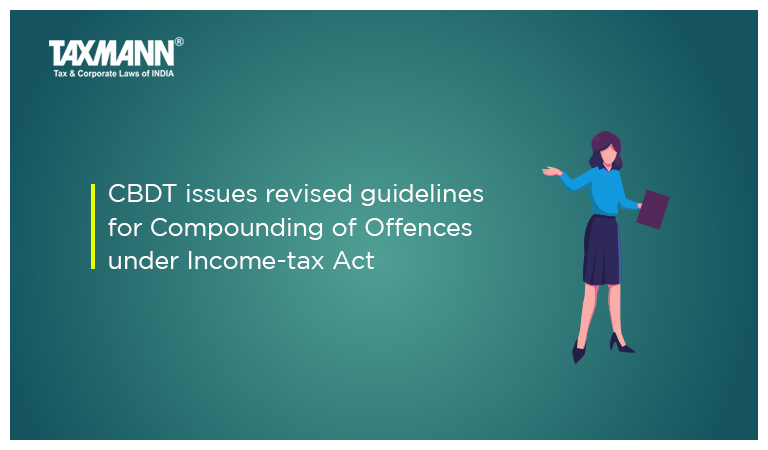CBDT issues revised guidelines for Compounding of Offences under Income-tax Act
- Blog|News|Income Tax|
- 2 Min Read
- By Taxmann
- |
- Last Updated on 19 September, 2022

Letter F.No. 285/08/2014-IT(lnv.V)/ 196, dated 16-09-2022
Compounding of an offence is a mechanism whereby the defaulter is reprieved of major legal consequences by affording him with an opportunity to pay a sum of money to escape prosecution. Any offence can be compounded by the Principal Chief Commissioner or Chief Commissioner or Principal Director-General or Director-General having jurisdiction over the assessee either before or after initiation of proceedings.
The Central Board of Direct Taxes (CBDT) has reviewed the guidelines on the compounding of offences under the Income-tax Act intending to simplify and facilitate the compounding of offences. Thus, in supersession of all earlier guidelines, the board has issued revised guidelines for compliance by all concerned.
These revised guidelines shall come into immediate effect and shall apply to all applications for compounding received on or after 16-09-2022. A few changes brought by the board under new guidelines are mentioned below:
a) The Board has clarified that the meaning of offences is classified into ‘Category A and Category B’. Category A offences are the ones where the offences are of technical nature and caused by an act of omission. Whereas Category B offences are non-technical offences attributed to an act of commission.
b) An offence punishable under section 276 has been moved from category A to category B. Section 276 talks about removal, concealment, transfer or delivery of property to thwart tax recovery.
c) The compounding charges shall be 1.25 times the normal compounding charges in case the application of compounding is filed after the end of 12 months, but within 24 months, from the end of the month in which prosecution complaint, if any, has been filed in the court of law.
d) Offences punishable under sections 275A & 275B shall not be compounded in any circumstances.
e) Erstwhile guidelines provided that offences committed by a person for which he was convicted by a court of law under Direct Taxes Laws are generally not to be compounded. The new guideline has relaxed this conditions to include that such person shall be convicted with imprisonment for two years or more.
Click Here To Read The Full Guidelines
Disclaimer: The content/information published on the website is only for general information of the user and shall not be construed as legal advice. While the Taxmann has exercised reasonable efforts to ensure the veracity of information/content published, Taxmann shall be under no liability in any manner whatsoever for incorrect information, if any.

Taxmann Publications has a dedicated in-house Research & Editorial Team. This team consists of a team of Chartered Accountants, Company Secretaries, and Lawyers. This team works under the guidance and supervision of editor-in-chief Mr Rakesh Bhargava.
The Research and Editorial Team is responsible for developing reliable and accurate content for the readers. The team follows the six-sigma approach to achieve the benchmark of zero error in its publications and research platforms. The team ensures that the following publication guidelines are thoroughly followed while developing the content:
- The statutory material is obtained only from the authorized and reliable sources
- All the latest developments in the judicial and legislative fields are covered
- Prepare the analytical write-ups on current, controversial, and important issues to help the readers to understand the concept and its implications
- Every content published by Taxmann is complete, accurate and lucid
- All evidence-based statements are supported with proper reference to Section, Circular No., Notification No. or citations
- The golden rules of grammar, style and consistency are thoroughly followed
- Font and size that’s easy to read and remain consistent across all imprint and digital publications are applied



 CA | CS | CMA
CA | CS | CMA
